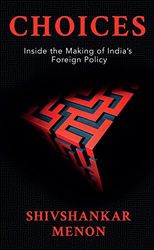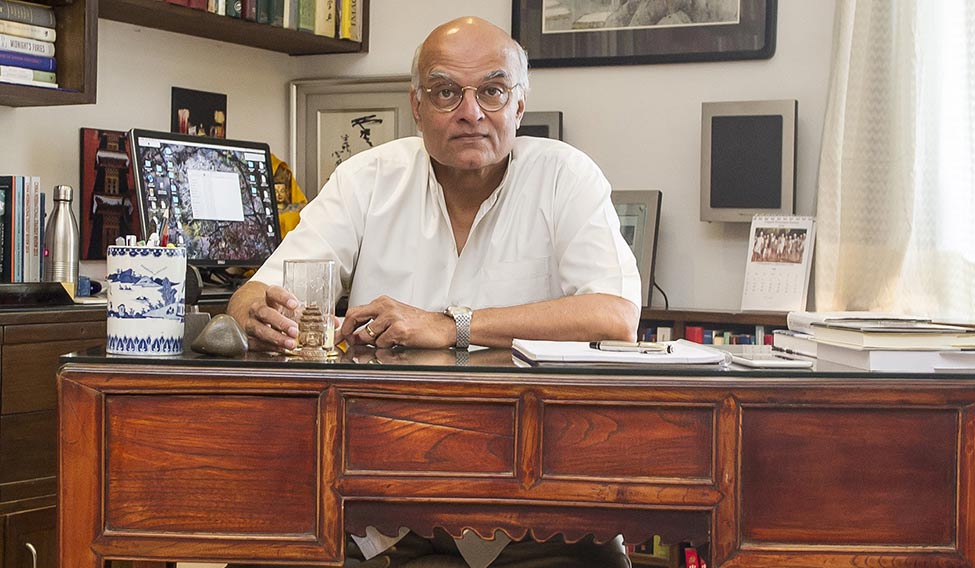Shivshankar Menon doesn't read fiction. There is too much non-fiction to read, he says. His latest book, Choices: Inside the Making of India's Foreign Policy, is a glimpse into five choices that have shaped Indian foreign policy, from Pakistan to the US civil nuclear deal to quietening China. Excerpts from an interview.
About pressing for visible retaliation after 26/11
At that time, that was my first reaction. But as I say in the book itself, you have to think differently from ‘He hit me, I will hit him back and feel better.’ There is more to this than an emotional response of retaliatory overt military force. But, I predicted in the book that if it happens again they must expect some kind overt military reaction, because it would mean that deterrence had broken down and must be established [again]. But one should understand both the utility of force and how limited it is.
You also say we didn’t respond. But we used covert diplomacy. Which means that there were covert measures?
Yes, but then you can’t talk about them because they wouldn't be covert, can you? That’s why I said if there is another big attack from across the border from Pakistan, that would mean that deterrence had failed and that you had to re-establish it. That would require a whole set of measures including military responses.
Because frankly, the combination of our responses after 26/11 meant that until 2014, there were three major terrorist attacks in India. None of them could actually be directly traced back to Pakistan. There may have been a Pakistani connection, but there wasn’t evidence linking them. The line [of control] was relatively quiet during this period. If you look at deaths caused by terrorism in India, if you look at ceasefire violations, if you look at terrorist attacks, the numbers steadily declined in that period until 2014. So, a certain amount of deterrence had been established. It wasn’t an ideal situation, but you could live with it… And you had enough to work with to go forward.
You also talk about public opinion.
There is a distinction between assessing public opinion—when you’re thinking what public opinion might be and therefore determining your actions—and leading public opinion.
After 2008, we had a general election in six months. One party tried in late January—twice I think—in their speeches to raise 26/11 saying: “Look at this government, how useless its response was.” The reaction they got back from the people was so negative that they never raised it again. It was never an issue in the 2009 election. This is a remarkable thing. That shows the wisdom of the Indian people, who disapproved of political use being made of a national issue.
It is one thing to have a democratic discussion in a democracy, to have discussions about foreign policy to discuss your choices, of course, and what you choose to do. I think that is essential because no one knows everything and discussion leads to better decisions. No one is always right. You need to be able to go through that process. It is another thing to determine foreign policy on the basis of what you think public opinion might be. Or whoever shouts loudest.
Do you think the surgical strike against Pakistan was a lot about spin, about what is perceived public opinion and whoever shouts loudest?
I really can’t speak of the considerations that went into this strike. I am not part of government. I don’t know how they decide, what they think of, what they want to achieve. I know what it is like to be second guessed. So, I am very careful about second guessing anyone else.
But to try and understand what is a surgical strike is.
I think the term 'surgical strike' has been misapplied. What did it excise or cut off? It is not surgical. And a strike? It was preemptive action against some terrorist launchpads along the Line of Control, in self-defence. That is something that has happened before and will happen again. The big difference is that this time it was made public. But, even here, when they made it public, they did it in terms suggesting it was limited, that they were not planning another—that it was preemptive but defensive. It was an attack on territory that is actually Indian, on terrorists who were going to attack us. So, it was justified. It was also kept within the bounds of strategic restraint. I am not sure that it should be called a surgical strike because it suggests that it has achieved much more. It hasn’t decapitated the terrorist groups.
In your chapter on Pakistan, you start with a quote from The Country Girl—“Any idiot can face a crisis. It is this day-to-day living that wears you out.” Do you think engagement with Pakistan will wear us out?
I think that is what we have to do. It is a long protracted affair, because the conditions that have led to cross border terrorism from Pakistan, most of which are structural or institutional on the Pakistani side, are not going away tomorrow.
So basically, we just live with it?
You have to. You can live with it. There are solutions to the issues between India and Pakistan. As you know we came very close, if you look at the record, during the UPA. But we were stymied by the kinds of structural and institutional factors on the Pakistani side that I don’t think we can solve today. I don’t see them changing very quickly. I could be wrong, I hope I am wrong, but..
How would you describe the situation between India and Pakistan now?
I would describe it as a problem that has to be managed. I don’t see it being the end of the world. Frankly, if you look at the larger purpose of Indian foreign policy, transforming India, this relationship is not central it.
Do you think a state of undeclared war?
I wouldn’t use such extreme words. You have this managed hostility, this limited conflict, which you have to live with and deal with.
Would you call this our worst moments in terms of relationship between both the countries?
Now? No, I wouldn’t. There have been much worse. We fought wars.
But people like Ayesha Siddiqa talk about this being worse, because when you fought wars, the hostility was over finally.
I think it is bad in the sense that there is not much hope. Today, you are probably at a low point in what people see as the future of that relationship and where it will go. In that sense, you are at a low point. But, only, in that sense. For me, it too dramatic to say that this is a low point in all history. No, we have been through much worse.
In your last chapter, you talk about force, diplomacy and even statecraft having limited utility in certain situations. And say it is logical to ask whether there is a time or place where war is justified. Is it?
I think it will happen anyway, whether it is justified or not. Men, will then, find ways of justifying it. And sometimes it is useful. For me the ultimate justification in politics is whether it achieves the ends. Whether the ends are good or bad, is a different argument. I do not get into the ethics of it in the book and I say so. But once you have agreed those ends and set those goals for yourself then, war is just an instrument.
Do you believe that there could be war?
A nuclear war between India and Pakistan? I certainly hope not. I think the purpose of all this is to prevent it.
Do you think war is an instrument we could use against Pakistan at this time?
Theoretically, it is one of the instruments. But it is not a very attractive instrument, it is also not a predictable instrument. No war follows a script. As the army says no plan survives first contact with the enemy. But if you ask me what are the chances of war between India and Pakistan, I would say low, for India, today. I don’t see how a war serves anybody’s interest, today. But the best way to keep it unlikely is to be prepared for one.
With China, you talk about how the settlement of the border issue is not necessarily a priority for both sides.
Both of us have managed the problem well for the last 30 years. Today, it is very hard to see either side politically having the need to settle the boundary dispute—maybe because we have been so successful in managing it, but also because it is politically hard. The technical work has all been done, but the politics of changing the way you draw the maps of your own country, of changing from the way we learned to draw our country in school, is not so easy. This is true for both India and China. That’s a big ask of a politician.
You have given the example of the intrusions that took place by PLA in Chumar when Chinese President Xi Jinping visited in September 2014, as well, a similar intrusion when PM Modi visited in April 2015. One of the reasons, you have cited for the behaviour, is to establish psychological dominance over a new Indian government.
I think, it is part of a much bigger relationship. There was a time, immediately, after the war when all we had in terms of the relationship was the boundary. Now, I think it is just one element of a much broader India-China relationship. Also, it is not the major element in the relationship. There are other things that require us to recalibrate the relationship with China.

There is the fact, more generally, that we are rubbing up against each other in the periphery which we share. That’s an exercise we need to do with China again. The last time we agreed the basics and fundamentals of our relationship was formalised during PM Rajiv Gandhi’s visit in 1988. It has worked well. But circumstances have changed. Both countries have changed. The world has changed. It is time to do it again and to find a new equilibrium in the relationship. The stresses have begun to show—the Masood Azhar listing or NSG membership issue: these are all signs of insufficient communication and a lack of a strategic framework for the relationship that both sides agree upon.
Choices: Inside the Making of Indian Foreign Policy
By Shivshankar Menon
Published by Pengiun Random House India
Price Rs 299; pages 224







